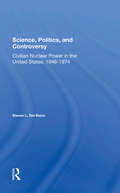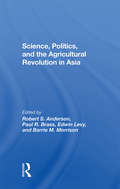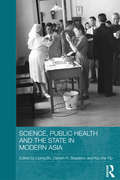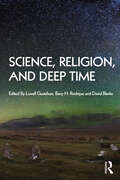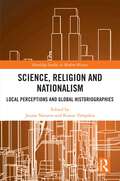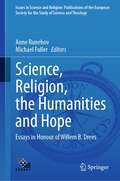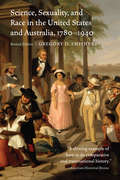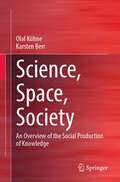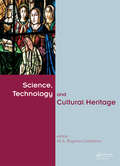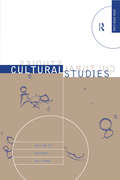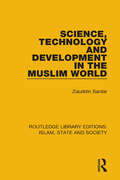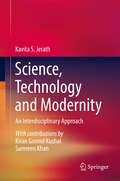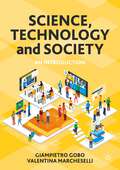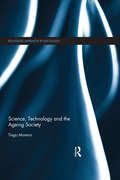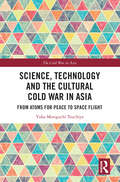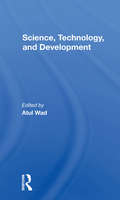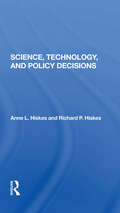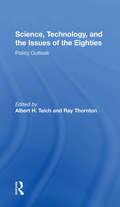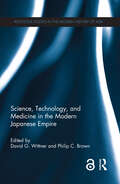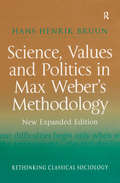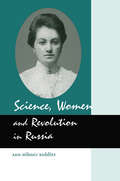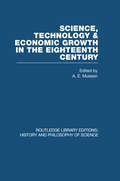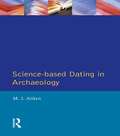- Table View
- List View
Science, Politics, And Controversy: Civilian Nuclear Power In The United States, 1946-1974 (Special Studies In Science, Technology, And Public Policy)
by Stephen L Del SestoAs of June 1977, the United States had some 232 nuclear power plants either planned or in operation, with a generating capacity estimated at about 321 million kilowatts. To date, the industrial world has spent over $200 billion in order to produce useful energy from nuclear fission. By all odds, civilian nuclear power is one of the largest technological ventures in history. To many, this massive effort is completely justified: No other single technology offers as much promise for satisfying world energy needs in the years ahead—particularly as fossil fuels dwindle and climb drastically in price. Yet to others, there is no single technology which raises such serious questions of risk to public health and safety.
Science, Politics, And The Agricultural Revolution In Asia
by Robert S Anderson Paul R Brass Edwin Levy Barrie MorrisonAgriculture in southern Asia has undergone a radical transformation in recent years, one that continues to alter the political economy of the area. Beyond the familiar elements of the green revolution, there has been an increase in resource exploitation for food production, and a rise in the economic and political strength of food producers, as wel
Science, Public Health and the State in Modern Asia (Routledge Studies in the Modern History of Asia)
by Liping Bu Ka-Che Yip Darwin H. StapletonThis book examines the encounter between western and Asian models of public health and medicine in a range of East and Southeast Asian countries over the course of the twentieth century until now. It discusses the transfer of scientific knowledge of medicine and public health approaches from Europe and the United States to several Asian countries — Singapore, Hong Kong, Indonesia, Sri Lanka, Japan, Taiwan, and China — and local interactions with, and transformations of, these public health models and approaches from the nineteenth century to the 1950s. Taking a critical look at assumptions about the objectiveness of science, the book highlights the use of scientific knowledge for political control, cultural manipulation, social transformation and economic needs. It rigorously and systematically investigates the historical developments of public health concepts, policies, institutions, and how these practices changed from colonial, to post-colonial and into the present day.
Science, Religion and Deep Time
by Lowell Gustafson Barry H. Rodrigue David BlanksThis book examines the meaning of religion within the scientific, evidence-based history of our known past since the big bang. While our current major religions are only centuries or millennia old, our volume discusses the origins and development of human religious practice and belief over our species’ existence of 300,000 years. The volume also connects the scientific approach to natural and social history with ancient truths of our religious ancestors using new lines of inquiry, new technologies, new modes of expression, and new concepts. It brings together insights of natural scientists, social scientists, philosophers, writers, and theologians to discuss narratives of the universe. The essays discuss that to apprehend religion scientifically, or to interpret and explain science theologically, the subject must be examined through a variety of disciplinary lenses simultaneously and raise several theoretical, philosophical, and moral problems. With a singular investigation into the meaning of religion in the context of the 13.8 billion-year history of our universe, this book will be indispensable for scholars and students of religious studies, big history, sociology and social anthropology, philosophy, and science and technology studies.
Science, Religion and Nationalism: Local Perceptions and Global Historiographies (Routledge Studies in Modern History)
by Jaume Navarro“Science” and “Religion” have been two major elements in the building of modern nation-states. While contemporary historiography of science has studied the interactions between nation building and the construction of modern scientific and technological institutions, “science-and-religion” is still largely based on a supposed universal historiography in which global notions of “science” and of “religion” are seldom challenged. This book explores the interface between science, religion and nationalism at a local level, paying attention to the roles religious institutions, specific confessional traditions, or an undefined notion of “religion” played in the construction of modern science in national contexts: the use of anti-clerical rhetoric as scapegoat for a perceived scientific and technological backwardness; the part of religious tropes in the emergence of a sense of belonging in new states; the creation of “invented traditions” that included religious and scientific myths so as to promote new identities; the struggles among different confessional traditions in their claims to pre-eminence within a specific nation-state, etc. Moreover, the chapters in this book illuminate the processes by which religious myths and institutions were largely substituted by stories of progress in science and technology which often contributed to nationalistic ideologies.
Science, Religion, the Humanities and Hope: Essays in Honour of Willem B. Drees (Issues in Science and Religion: Publications of the European Society for the Study of Science and Theology #8)
by Michael Fuller Anne RunehovThis book collects a multidisciplinary range of contributions focusing on the prolific and seminal work of Willem Drees in the fields of philosophy of religion, philosophy of the humanities, and science and theology/religion. Trained in both theoretical physics and theology/philosophy of religion, Drees holds doctoral degrees in both theology and in philosophy and, amongst other distinguished positions, held professorships at the University of Leiden and at the University of Tilburg. Drees was also Editor-in-Chief of Zygon, Journal of Religion & Science, between 2008 and 2018, and served as President of the European Society for the Study of Science and Theology (ESSSAT) between 2002 and 2008. In 2018, he was elected as member of the Royal Holland Society of Sciences and Humanities (KHMW). This contributed volume builds on Drees’ expansive and provocative scholarly contributions, notably around the concept and meaning of naturalism and the humanities to the fields of science and religion, as exemplified by his works Religion, Science and Naturalism (1996) and What Are the Humanities For? (2021). In a time where more and more young people across the globe are entering higher education such cross-disciplinary explorations and (re-)evaluations are vital to the field. Accordingly, by approaching his work from a variety of disciplines this collection illuminates the broad reach of Drees’ work and provides scholars from various fields with many new and rich opportunities avenues for research.
Science, Sexuality, and Race in the United States and Australia, 1780–1940, Revised Edition
by Gregory D. SmithersScience, Sexuality, and Race in the United States and Australia, 1780–1940, Revised Edition is a sociohistorical tour de force that examines the entwined formation of racial theory and sexual constructs within settler colonialism in the United States and Australia from the Age of Revolution to the Great Depression. Gregory D. Smithers historicizes the dissemination and application of scientific and social-scientific ideas within the process of nation building in two countries with large Indigenous populations and shows how intellectual constructs of race and sexuality were mobilized to subdue Aboriginal peoples. Building on the comparative settler-colonial and imperial histories that appeared after the book’s original publication, this completely revised edition includes two new chapters. In this singular contribution to the study of transnational and comparative settler colonialism, Smithers expands on recent scholarship to illuminate both the subject of the scientific study of race and sexuality and the national and interrelated histories of the United States and Australia.
Science, Social Science Volume 3 Term 2 class 6 - Tamil Nadu Board
by Tamil GovernmentThe Science textbook for standard six has been prepared following the guidelines given in the National Curriculum Framework 2005. The book is designed to maintain the paradigm shift from the primary General Science to branches as Physics, Chemistry, Botany and Zoology.
Science, Space, Society: An Overview of the Social Production of Knowledge
by Olaf Kühne Karsten BerrThis volume provides a basic introduction to the philosophy of science and its central concepts, theories, and philosophical, scientific, and spatial positions and approaches.
Science, Technology and Cultural Heritage
by Miguel Ángel Rogerio-CandeleraThe Second International Congress on Science and Technology for the Conservation of Cultural Heritage was held in Seville, Spain, June 24-27, 2014, under the umbrella of the TechnoHeritage network. TechnoHeritage is an initiative funded by the Spanish Ministry of Economy and Competitivity dedicated to the creation of a network which integrates CSIC
Science, Technology and Culture: Cultural Studies Volume 12 Issue 3
by Ann BalsamoFirst published in 1998. Routledge is an imprint of Taylor & Francis, an informa company.
Science, Technology and Development in the Muslim World (Routledge Library Editions: Islam, State and Society)
by Ziauddin SardarThis book, first published in 1977, aims to present a Muslim view of development and highlights some of the related issues that were being debated in the Muslim world. The author outlines the parameters of the Muslim world as well as the Muslim world-view, and provides an analysis of science, science policy and Muslim culture. This title will be of interest to students of economic and social policy, as well as students of Middle Eastern studies.
Science, Technology and Modernity: An Interdisciplinary Approach
by Kavita S. JerathThis book provides a full scale description and discussion of science, technology, society, cross-cultural communication and modernity and is presented at a level that makes it accessible to the interested academic. Starting with the historical overview, the text outlines the relevance of technology today and in the future. Then follows an introduction to the discovery and invention by agricultural, feudal, capitalist and socialist systems, and conversely the ways in which science and technology has altered economic, social, and political beliefs and practices during industrial revolutions and have transformed the whole nature of human society. Tracing the relationship between science and technology from dawn to civilization to the twenty first century, the book argues that technology is applied science and vice versa and this phenomenon emerged relatively recently, as industry and governments began funding scientific research that would lead to new technologies. The book goes beyond technology by also describing the path from modernity to post modernity and discussing the theories of modernity. Further the internet and social media receive increased attention as well. Finally, the discussion turns to the future structure of society and gender equality, expected to have a more distributed future generation, thereby addressing the synergies between education system, globalization and cross-cultural communication.This book is designed as the primary general textbook for Engineers at the undergraduate level in any university. This course is a multidisciplinary elective course from emerging areas in the 4- year institution and is a required course in most universities.
Science, Technology and Society
by Martin Bridgstock Ian Lowe David Burch John Forge John LaurentThis book provides a comprehensive introduction to the human, social and economic aspects of science and technology. It examines a broad range of issues from a variety of perspectives, using examples and experiences from around the world. The authors present complex issues, including the responsibilities of scientists, ethical dilemmas and controversies, the Industrial Revolution, economic issues, public policy, and science and technology in developing countries. The book ends with a thoughtful and provocative look toward the future. It features extensive guides to further reading, as well as a useful section on information searching skills. This book will provoke, engage, inform and stimulate thoughtful discussion about culture, society and science. Broad and interdisciplinary, it will be of considerable value to both students and teachers.
Science, Technology and Society: An Introduction
by Giampietro Gobo Valentina MarcheselliScience, Technology and Society: An Introduction provides students with an accessible overview of the interdisciplinary field of Science and Technology Studies (STS). The discipline breaks down traditional conceptions of knowledge as universal, neutral and ahistorical, and takes a more critical approach to science and technology as social embedded phenomena. This comprehensive textbook makes use of unique examples and case studies to illustrate theoretical debates and concepts. In addition, the reader acquires a unique vision of contemporary issues (such as the power of algorithms, the mystification of fake news, the role of experts within the decision-making process, for example). Each chapter incorporates pedagogically rich features, including interactive discussion points to be used individually or in class as prompts for debate.
Science, Technology and the Ageing Society (Routledge Advances in Sociology)
by Tiago MoreiraAgeing is widely recognised as one of the social and economic challenges in the contemporary, globalised world, for which scientific, technological and medical solutions are continuously sought. This book proposes that science and technology also played a crucial role in the creation and transformation of the ageing society itself. Drawing on existing work on science, technology and ageing in sociology, anthropology, history of science, geography and social gerontology, Science, Technology and the Ageing Society explores the complex, interweaving relationship between expertise, scientific and technological standards and social, normatively embedded age identities. Through a series of case studies focusing on older people, science and technology, medical research about ageing and ageing-related illnesses, and the role of expertise in the management of ageing populations, Moreira challenges the idea that aging is a problem for the individual and society. Tracing the epistemic and technological infrastructures that underpin multiple of ways of aging, this timely volume is a crucial tool for undergraduate and graduate students interested in social gerontology, health and social care, sociology of aging, science and technology studies and medical sociology.
Science, Technology and the Cultural Cold War in Asia: From Atoms for Peace to Space Flight (The Cold War in Asia)
by Yuka Moriguchi TsuchiyaTsuchiya presents a new insight into the political roles of science and technology during the Cold War era in Asia. The Cold War was not only a battle of conflicting ideologies and economic systems, but also a competition of cultures and lifestyles, and a battle to win hearts and minds of people in developing countries. Tsuchiya argues that science and technology were an integral part of how culture was deployed strategically. She discusses the 1950s and early 1960s: the Eisenhower and Kennedy presidencies in the U.S., and the decolonization and nation-building efforts in Japan, South Vietnam, Burma, and Indonesia. She also sheds light on the way U.S. technological aid programs such as Foreign Atoms for Peace, and the Overseas Information Program were received by Asian leaders, technocrats, and scientists. Provides valuable insight for scholars of Cold War History in Asia and US Foreign Policy.
Science, Technology, And Development
by Atul WadThis book examines issues specific to the regions of Latin America and Africa and deals with an issue that Africa has shown the least progress in terms of science and technology and yet it is a region where the needs are urgent in human terms.
Science, Technology, And Policy Decisions
by Anne L. Hiskes Richard P. HiskesThis text, written by a philosopher of science and a political theorist, introduces students to the issues and controversies surrounding science and technology policy in the United States. As the impact of technological advancement is increasingly felt, the policy-making process for science and technology is undergoing a marked transition. The making of this policy is no longer solely the function of government agencies and institutions. New actors in the policy arena are raising questions about the future of technological advancement in the United States and elsewhere, and their voices are affecting—sometimes obstructing—the traditional policy process. This book surveys the entire domain of science and technology policy making with special emphasis on the growing role of citizen participation, the ethical issues raised by modern policy problems, and the general principles that guide current policy. The authors discuss current philosophical views about the nature of science and technology as social and political entities and also consider the history of the relations between these fields and political authority. They combine an issues and case study approach with a narrative discussion of how ethical, participatory, and institutional factors have merged in the policy process. Among the topics addressed are nuclear power and siting policy, hazardous waste, communications technology, and biomedical technology. After reviewing the difficult problems facing the modern policy maker, the authors assess the methods and ethical assumptions of the current policy-making framework and consider alternatives that are more sensitive to the complexity of contemporary policy issues. Intended as a core text for courses in "Science, Technology, and Public Policy," the book can also be used in interdisciplinary courses focusing on the relationship between science, technology, and society. The text is also appropriate for courses in the philosophy of science and technology and for courses in social and political philosophy.
Science, Technology, And The Issues Of The Eighties: Policy Outlook
by Albert H. Teich Ray ThorntonFirst published in 1982. Recognizing that science and technology have become increasingly relevant to important public policy issues, Congress has mandated the periodic preparation of a "Five Year Outlook for Science and Technology" to help U.S. policymakers anticipate and deal with these issues more effectively. This book, the result of a study conducted by the American Association for the Advancement of Science for the second such "Outlook," identifies and explores domestic and international policy concerns in which science and technology are critical factors. The authors’ interdisciplinary, nontechnical approach provides policymakers, students and others interested in science, technology and public affairs with a timely overview of nine areas that are likely to become the world’s most pressing concerns over the years.
Science, Technology, and Medicine in the Modern Japanese Empire (Routledge Studies in the Modern History of Asia)
by David G. Wittner Philip C BrownScience, technology, and medicine all contributed to the emerging modern Japanese empire and conditioned key elements of post-war development. As the only emerging non-Western country that was a colonial power in its own right, Japan utilized these fields not only to define itself as racially different from other Asian countries and thus justify its imperialist activities, but also to position itself within the civilized and enlightened world with the advantages of modern science, technologies, and medicine. This book explores the ways in which scientists, engineers and physicians worked directly and indirectly to support the creation of a new Japanese empire, focussing on the eve of World War I and linking their efforts to later post-war developments. By claiming status as a modern, internationally-engaged country, the Japanese government was faced with having to control pathogens that might otherwise not have threatened the nation. Through the use of traditional and innovative techniques, this volume shows how the government was able to fulfil the state’s responsibility to protect society to varying degrees. The contributors push the field of the history of science, technology and medicine in Japan in new directions, raising questions about the definitions of diseases, the false starts in advancing knowledge, and highlighting the very human nature of fields which, on the surface, seem to non-specialists to be highly rational. Challenging older interpretative tendencies, this book highlights the vigour of the field and the potential for future development. Therefore, it will be of huge interest to students and scholars of Japanese history, Asian history, the history of science and technology and the history of medicine.
Science, Values and Politics in Max Weber's Methodology: New Expanded Edition (Rethinking Classical Sociology)
by Hans Henrik BruunFirst published in 1972, this book on Weber's methodological writings is today regarded as a modern classic in its field. In this new expanded edition, the author has revised and updated the original text, and translated the numerous German quotations into English. He has also added a new introduction, where he discusses major issues raised in the relevant secondary literature since 1972. The author traces the relationship between values and science in Max Weber's methodology of its central aspects: value freedom, value relation (Wertbeziehung), value analysis, the ideal type and the special problems which pertain to the sphere of politics. Weber's thought is presented and discussed on the basis of a meticulous analysis of all available, published or unpublished, original material. The book is indispensable for all serious Weber scholars and provides the general student with a clear, accessible and authoritative exposition of major aspects of Weber's methodology.
Science, Women and Revolution in Russia
by KoblitzWhile the women's movement might seem like a relatively new concept, Russian women of the 1860s deserve to be acknowledged as individuals who changed the direction of science and opened the doors of higher education to women throughout Europe. The 1860's and 1870's witnessed a rise in women's consciousness and the beginnings of the Russian revolutionary movement that saw women pursue and receive doctorates in many areas of science. These same women went on to become some of the brightest in their fields. This book provides a look at Russian women scientists of the 1860's, their personal independence, and technical and literary achievements that made science the popular social movement of the time and changed the face of the Russian intellectual culture.
Science, technology and economic growth in the eighteenth century
by A E MussonOriginally published in 1972.This book illustrates the growing awareness of the importance of science and technology in the Industrial Revolution. The contributors show that the growth in the teaching and literature of natural philosophy (mechanics, hydraulics etc), mathematics and chemistry, together with such new agencies as "philosophical societies", itinerant lecturers and libraries were significant factors in the development of the Industrial Revolution.
Science-Based Dating in Archaeology (Longman Archaeology Series)
by M. J. AitkenArchaeologists and archaeology students have long since needed an authoritative account of the techniques now available to them, designed to be understood by non-scientists. This book fills the gap and it offers a two-tier approach to the subject. The main text is a coherent introduction to the whole field of science-based dating, written in plain langauge for non-scientists. Additional end-notes, however, offer a a more technical understanding, and cater for those who have a scientific and mathematical background.
